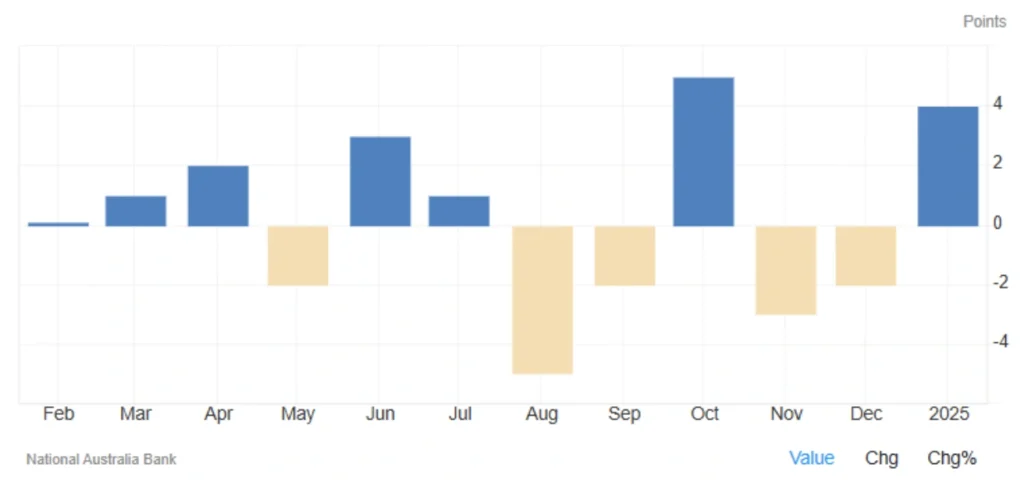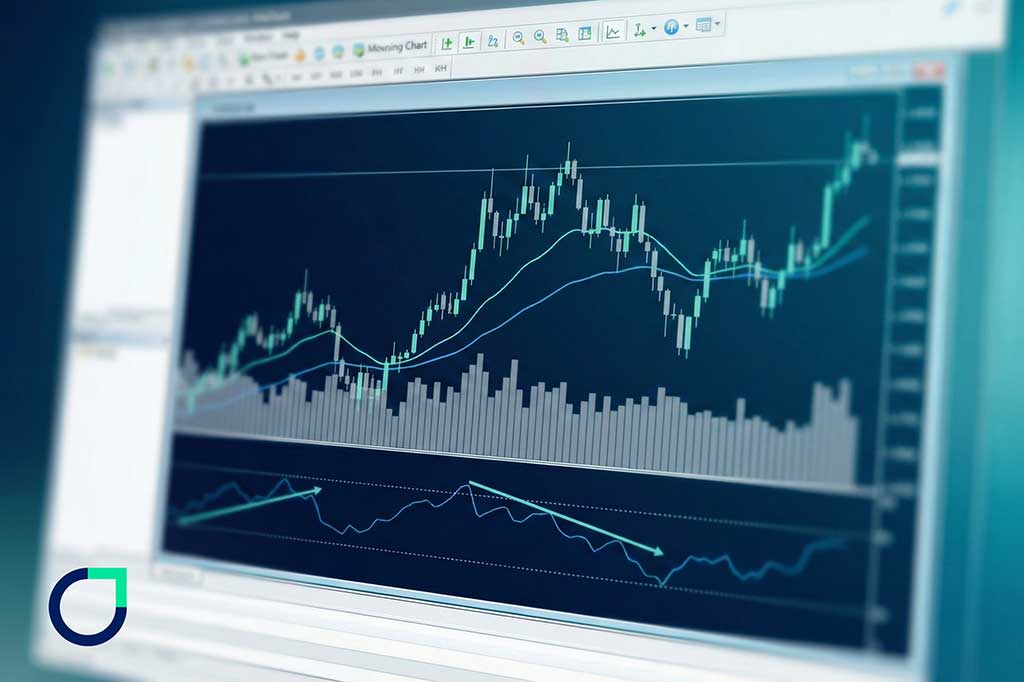
Australia’s Business Confidence Rebounds in January 2025
Australia’s business confidence is showing signs of recovery, with the NAB Business Confidence Index rising to 4 points in January 2025. This marks a significant jump from -2 in December and is the first positive reading since October. While confidence is improving, business conditions have weakened, painting a mixed picture for the economy.
A Positive Shift in Business Confidence
First Positive Reading in Months
The NAB Business Confidence Index climbed into positive territory for the first time since October 2024. This uptick reflects growing optimism across multiple industries, pushing confidence back toward its long-term average.
Industry-Wide Growth
Confidence gains were not limited to a single sector. Instead, they were seen across various industries, signaling a broader economic shift.
However, despite the positive sentiment, business conditions tell a different story.
Business Conditions Take a Step Back
Declining Sales and Profitability
- Business conditions dropped from 6 to 3 points, falling below the historical average of 7.
- Sales slowed down, with the index declining from 10 in December to 6.
- Profitability turned negative, dropping from 4 to -2.
Employment Holds Steady
On a brighter note, employment numbers improved slightly, rising from 4 to 5 points—a sign that businesses are still willing to hire despite broader economic challenges.
Sector Winners and Losers
Not all industries felt the same impact. While some sectors gained momentum, others struggled.
Industries Facing Challenges
- Mining, retail, and finance saw declines in business conditions.
- Lower consumer spending and global commodity trends played a role in these setbacks.
Sectors Showing Strength
- Wholesale, transport, and manufacturing showed positive growth.
- Supply chain improvements and business expansion contributed to the uptick.
Read More: Australia Judo Bank Manufacturing PMI
Investment and Future Orders Dip
Lower Future Orders Signal Uncertainty
The future orders index dropped from -2 to -3, indicating that businesses remain cautious about upcoming demand.
Decline in Capacity Utilization and Investment
- Capacity utilization decreased from 82.7% to 82.0%, suggesting businesses are operating below peak efficiency.
- Investment levels fell sharply from 11 to 4, highlighting potential hesitancy in expansion plans.
Rising Costs & Inflation Pressures
Inflation remains a concern, with rising costs across the board.
Higher Operating Costs
- Purchase costs increased to 1.1% on a quarterly basis.
- Labor costs jumped to 1.8%, putting pressure on businesses.
Minimal Price Growth
- Product prices remained steady at 0.8% growth.
- Retail prices saw a slight uptick to 0.9%, indicating some ability to pass costs onto consumers.
What Analysts Are Saying
Alan Oster, Chief Economist at NAB, weighed in on the data:
“While demand remains resilient, economic growth is likely to stay weak.”
This suggests that while businesses feel more optimistic, the broader economy is still facing hurdles.
What This Means for Australia’s Economy
1. Confidence is Rising, But Challenges Remain
A stronger business confidence index is encouraging, but weaker business conditions and lower investment suggest the road to recovery isn’t guaranteed.
2. Industry Performance is Uneven
While some sectors are growing, others—especially mining and retail—are still struggling.
3. Inflationary Pressures Could Impact Growth
Rising labor and purchase costs may squeeze business margins and keep inflation in focus for policymakers.

The NAB Business Confidence Index: Why It Matters
What is the NAB Business Confidence Index?
This index measures how business leaders feel about the economy. Positive readings suggest optimism and potential growth, while negative readings signal uncertainty or downturns.
Why Should Investors and Businesses Pay Attention?
- Economic Indicator – Higher confidence often leads to increased investment and job creation.
- Impact on Interest Rates – The Reserve Bank of Australia (RBA) monitors this data for monetary policy decisions.
- Market Influence – Shifts in confidence can affect the Australian dollar and investor sentiment.
Final Thoughts: Is Economic Growth Sustainable?
The rebound in business confidence is a positive sign, but weaker conditions, lower investment, and rising costs highlight ongoing risks. Investors and policymakers will need to keep a close eye on employment trends, inflation, and RBA policy decisions in the coming months.
Share
Hot topics

The best indicator for short term trading
When it comes to short-term trading, everything happens quickly. Movement can take place over a matter of minutes; momentum can build and fade quickly; and traders often have to make...
Read more




Submit comment
Your email address will not be published. Required fields are marked *